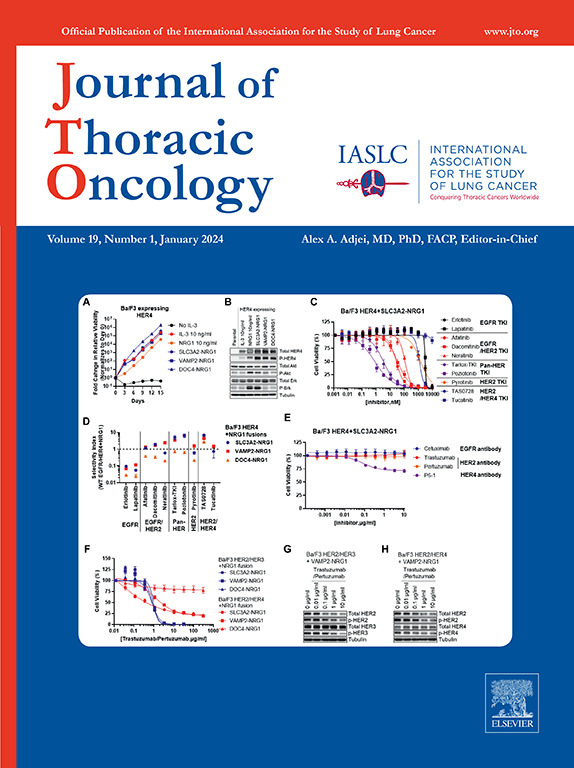Neoadjuvant and Adjuvant Treatments for Early Stage Resectable NSCLC: Consensus Recommendations From the International Association for the Study of Lung Cancer
IF 21
1区 医学
Q1 ONCOLOGY
引用次数: 0
Abstract
Advances in the multidisciplinary care of early stage resectable NSCLC (rNSCLC) are emerging at an unprecedented pace. Numerous phase 3 trials produced results that have transformed patient outcomes for the better, yet these findings also require important modifications to the patient treatment journey trajectory and reorganization of care pathways. Perhaps, most notably, the need for multispecialty collaboration for this patient population has never been greater. These rapid advances have inevitably left us with important gaps in knowledge for which definitive answers will only become available in several years. To this end, the International Association for the Study of Lung Cancer commissioned a diverse multidisciplinary international expert panel to evaluate the current landscape and provide diagnostic, staging, and therapeutic recommendations for patients with rNSCLC, with particular emphasis on patients with American Joint Committee on Cancer-Union for International Cancer Control TNM eighth edition stages II and III disease. Using a team-based approach, we generated 19 recommendations, of which all but one achieved greater than 85% consensus among panel members. A public voting process was initiated, which successfully validated and provided qualitative nuance to our recommendations. Highlights include the following: (1) the critical importance of a multidisciplinary approach to the evaluation of patients with rNSCLC driven by shared clinical decision-making of a multispecialty team of expert providers; (2) biomarker testing for rNSCLC; (3) a preference for neoadjuvant chemoimmunotherapy for stage III rNSCLC; (4) equipoise regarding the optimal management of patients with stage II between upfront surgery followed by adjuvant therapy and neoadjuvant or perioperative strategies; and (5) the robust preference for adjuvant targeted therapy for patients with rNSCLC and sensitizing EGFR and ALK tumor alterations. Our primary goals were to provide practical recommendations sensitive to the global differences in biology and resources for patients with rNSCLC and to provide expert consensus guidance tailored to the individualized patient needs, goals, and preferences in their cancer care journey as these are areas where physicians must make daily clinical decisions in the absence of definitive data. These recommendations will continue to evolve as the treatment landscape for rNSCLC expands and more knowledge is acquired on the best therapeutic approach in specific patient and disease subgroups.
早期可切除非小细胞肺癌 (NSCLC) 的新辅助治疗和辅助治疗:国际肺癌研究协会(IASLC)的共识建议。
早期可切除非小细胞肺癌(rNSCLC)的多学科治疗正以前所未有的速度取得进展。大量的三期试验结果改善了患者的预后,但这些结果也要求对患者的治疗过程轨迹进行重要调整,并重新组织治疗路径。也许最值得注意的是,这一患者群体对多专科协作的需求从未像现在这样强烈。这些突飞猛进的进展不可避免地给我们留下了一些重要的知识空白,而这些空白只有在数年后才能得到明确的答案。为此,IASLC 委托一个多元化的多学科国际专家小组来评估目前的状况,并为 rNSCLC 患者提供诊断、分期和治疗建议,重点是 AJCC/UICC TNM 第 8 版 II 期和 III 期患者。我们采用以团队为基础的方法,提出了 19 项建议,除一项建议外,其他建议均在专家组成员之间达成了 85% 以上的共识。我们还启动了公众投票程序,该程序成功验证了我们的建议,并为我们的建议提供了质的细微差别。重点包括1)在多专科专家团队共同临床决策的推动下,采用多学科方法评估 rNSCLC 患者至关重要;2)rNSCLC 的生物标志物检测;3)III 期 rNSCLC 首选新辅助化疗免疫疗法;4)对于 II 期患者的最佳治疗,在先手术后辅助治疗和新辅助/围手术期治疗策略之间存在分歧;以及 5)对于有 EGFR 和 ALK 敏感性肿瘤改变的 rNSCLC 患者,更倾向于辅助靶向治疗。我们的主要目标是针对 rNSCLC 患者在生物学和资源方面的全球差异提供实用建议,并根据患者在癌症治疗过程中的个性化需求、目标和偏好提供专家共识指导,因为这些领域是医生在缺乏明确数据的情况下必须做出日常临床决策的领域。随着 rNSCLC 治疗范围的不断扩大,以及对特定患者和疾病亚群最佳治疗方法的进一步了解,这些建议将不断发展。
本文章由计算机程序翻译,如有差异,请以英文原文为准。
求助全文
约1分钟内获得全文
求助全文
来源期刊

Journal of Thoracic Oncology
医学-呼吸系统
CiteScore
36.00
自引率
3.90%
发文量
1406
审稿时长
13 days
期刊介绍:
Journal of Thoracic Oncology (JTO), the official journal of the International Association for the Study of Lung Cancer,is the primary educational and informational publication for topics relevant to the prevention, detection, diagnosis, and treatment of all thoracic malignancies.The readship includes epidemiologists, medical oncologists, radiation oncologists, thoracic surgeons, pulmonologists, radiologists, pathologists, nuclear medicine physicians, and research scientists with a special interest in thoracic oncology.
 求助内容:
求助内容: 应助结果提醒方式:
应助结果提醒方式:


